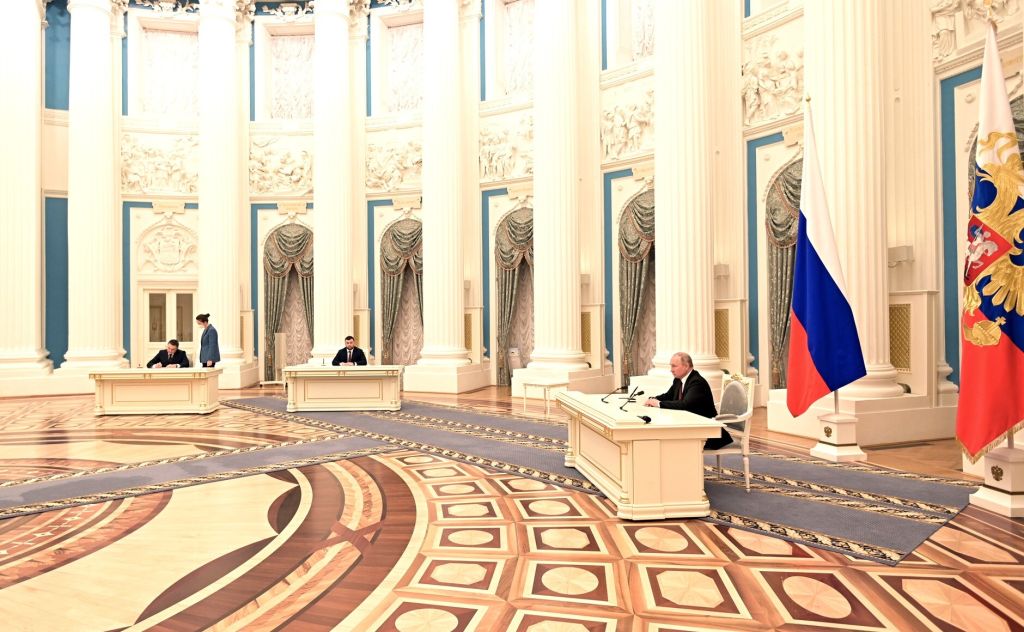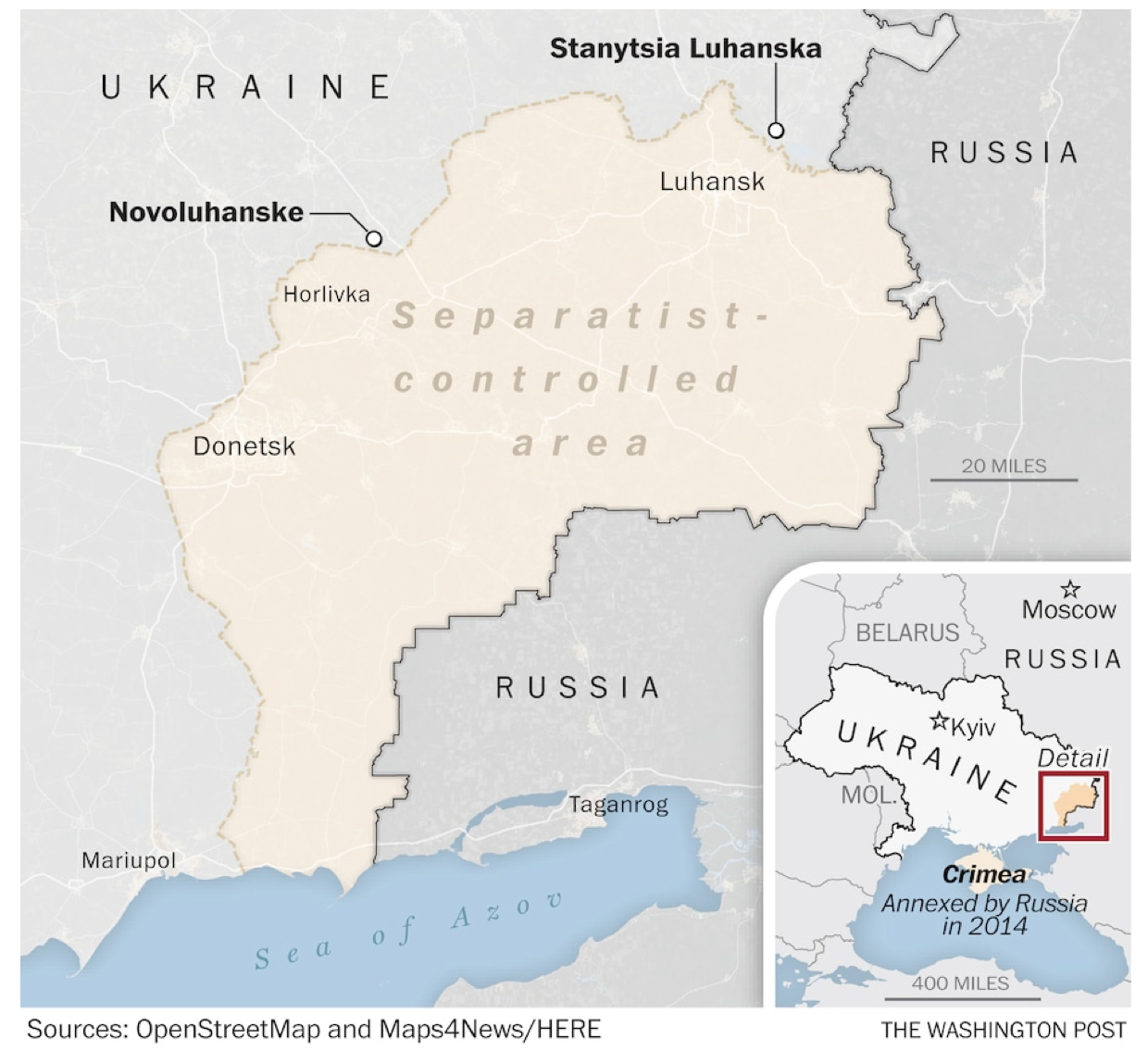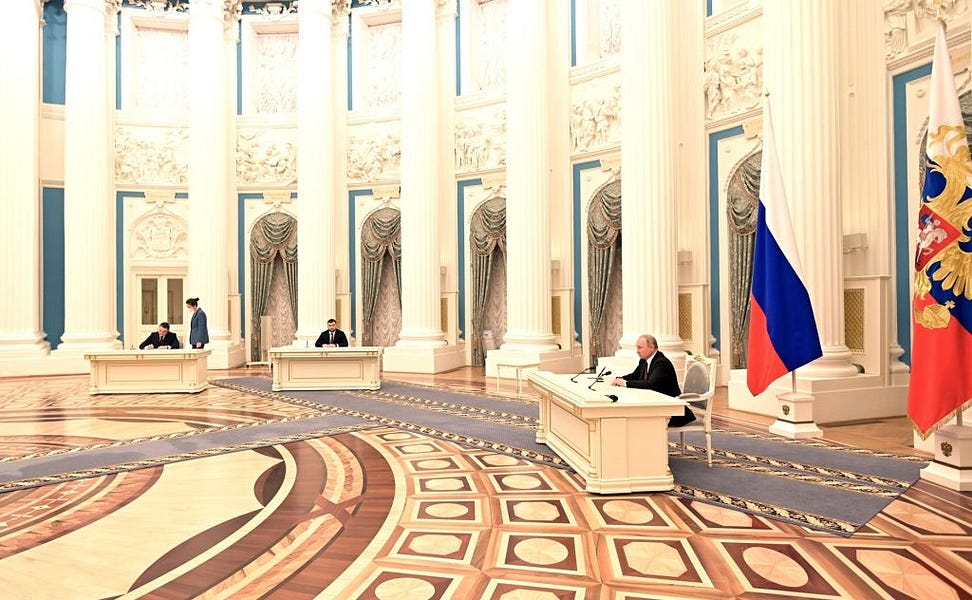Happy Tuesday! We’re doing back-to-back newsletters on Russia and Ukraine—and we’ll probably end up doing back-to-back-to-back-to-back newsletters on it, too. Keep reading to find out why.
Quick Hits: Today’s Top Stories
-
In a winding speech delivered on Monday, President Vladimir Putin said Russia would “immediately” recognize the independence and sovereignty of the separatist Donetsk and Luhansk “republics” in eastern Ukraine. In a decree issued Monday, the Kremlin ordered Russian forces into the Ukrainian-controlled territories for “peacekeeping” purposes, a move seen by Western leaders as a pretext for a larger invasion.
-
The White House responded to Putin’s move, with President Joe Biden signing an executive order imposing sanctions aimed at prohibiting “new investment, trade, and financing” by U.S. persons in the Donetsk and Luhansk regions. “These measures are separate from and would be in addition to the swift and severe economic measures we have been preparing in coordination with Allies and partners should Russia further invade Ukraine,” White House Press Secretary Jen Psaki added. A senior administration official told reporters last night the administration will take “further actions” today.
-
German Chancellor Olaf Sholz said Tuesday that Germany is pausing certification of the Nord Stream 2 gas pipeline, a project intended to bring Russian gas to the German market that the U.S. has opposed. “The situation has fundamentally changed,” Sholz said.
-
Canada’s House of Commons voted 185-151 on Monday to approve of Prime Minister Justin Trudeau’s invocation of the Emergencies Act, allowing Canada’s Liberal government continued use (through mid-March) of extraordinary powers to disband anti-mandate protests across the country. Asked Monday if the provisions are still needed since police cleared the main Ottawa protest over the weekend, Trudeau said he wouldn’t continue using the Act “a single day longer than necessary.”
-
Several Federal Reserve officials—including New York and Cleveland Fed Presidents John Williams and Loretta Mester—indicated Friday the central bank committee is leaning against an initial 50-basis-point interest rate hike next month, likely opting instead for a series of 0.25-percentage-point increases. Senior Fed officials will soon be barred from buying and selling individual securities and commodities, with the central bank adopting new rules last week in the wake of a series of trading scandals.
-
Colombia’s Constitutional Court voted 5-4 on Monday to decriminalize abortion during the first 24 weeks of a woman’s pregnancy, joining Mexico and Argentina as the third Latin American country to do so in the past 14 months. The procedure had been permitted since 2006 in cases of rape, nonviability, or when the life of the mother was at risk.
-
With the average number of daily confirmed cases down 47 percent over the past two weeks, Prime Minister Boris Johnson announced yesterday the United Kingdom would end all remaining COVID-19 restrictions on Thursday, including the legal requirement to self-isolate after a positive test.
Russia Invades Ukraine

Well, here we go.
After months of warnings about a military buildup that reached a fever pitch in recent days, the Russian reinvasion of Ukraine is beginning.
Seated behind a desk and flanked by two Russian flags, President Vladimir Putin delivered a paranoid, hour-long speech Monday evening announcing Russia would “immediately” recognize the independence and sovereignty of the separatist Donetsk and Luhansk “People’s Republics” in eastern Ukraine. In many ways, the stemwinder echoed a bizarre revisionist treatise Putin authored last July on the shared history of the two countries.
“Modern-day Ukraine was in full and in whole created by Russia,” Putin said, growing increasingly agitated as the address wore on. “And now grateful descendants have demolished monuments to [erstwhile Soviet Union leader Vladimir] Lenin in Ukraine. This is what they call decommunization. Do you want decommunization? Well, that suits us just fine. But it is unnecessary, as they say, to stop halfway. We are ready to show you what real decommunization means for Ukraine.”
That ominous tone was present throughout the speech, with Putin grumbling about the demise of the Soviet Union, rejecting the very concept of Ukrainian statehood, and accusing Ukraine’s leaders—without evidence—of committing heinous crimes against the Russian people and acting as Western “puppets” seeking to thwart Russia’s interests. “Ukraine will serve as a forward springboard for the strike,” he alleged, maintaining the United States is planning a preemptive attack on Russia’s missile systems. “If our ancestors had heard about it, they probably would simply not have believed it. And today we don’t want to believe it, but it’s true.”
Much of Putin’s tirade wasn’t true, of course, but its implications were unambiguous. “He clearly set up the argument that Ukraine, at a minimum, needs to be brought back into Russia’s sphere of influence so as not to allow the West to use it to dominate Russia,” Dmitri Alperovitch—the Russian-born co-founder of both CrowdStrike and the Silverado Policy Accelerator—told The Dispatch. “Given all the pretexts that they’ve been inventing over the last few weeks, including allegations of military activity by Ukrainian forces that the Ukrainian government has denied, it seems that now the stage is set for war.”
The Biden administration appears to agree, with Secretary of State Antony Blinken announcing yesterday State Department personnel in Ukraine—who had already left Kyiv for the western city of Lviv—would leave the country entirely and spend the night in Poland.
Earlier on Monday, the Russian military said it killed five Ukrainian “saboteurs” for driving their tanks into Russian territory, a claim Ukrainian Foreign Affairs Minister Dmytro Kuleba denied as straight out of Moscow’s “fake-producing factory.” The United States has for weeks warned that any broader Russian invasion of Ukraine would likely begin with a false-flag operation depicting Ukrainian aggression.
There will be plenty of opportunities in the coming days to stage such an event. Putin, in a decree issued after his speech on Monday, ordered the Russian military into what he labeled the Donetsk People’s Republic (DPR) and the Luhansk People’s Republic (LPR) for “peacekeeping” purposes. One week earlier, the Russian State Duma had passed a resolution urging Putin to acknowledge the autonomy of the Donbas regions’ two pro-Moscow separatist enclaves —which were established in 2014 after Ukrainian protesters ousted the Kremlin-aligned President Viktor Yanukovych and overthrew the government. Putin was more than happy to oblige, violating the Minsk agreements negotiated in 2014 and 2015.
“From those who seized and hold power in Kyiv, we demand an immediate cessation of hostilities,” Putin said, referring to the years of skirmishes between the pro-Russian and pro-Ukrainian forces in the region that have left 14,000 dead and displaced more than 1 million others. “Otherwise, all responsibility for the possible continuation of the bloodshed will be entirely on the conscience of the regime ruling on the territory of Ukraine.”
Russia’s formal recognition of the DPR and LPR allows the country to sign treaties of friendship and mutual assistance with the territories, which, in Putin’s eyes, provide more than enough cover to send “peacekeeping” forces across the border.

Thomas Graham—senior director for Russia on the White House National Security Council from 2004 to 2007—sees some historical parallels. “It’s a little bit like what happened in Georgia in 2008: Some peacekeepers get killed by the Georgians, and that provides the basis for a larger invasion of Georgian territory,” he told The Dispatch. “If any peacekeeper is injured or killed [here], they’ll take this as Ukrainians firing on Russians, killing Russians, and therefore Russia has a sacred obligation to respond in some way—so that provides the pretext for a larger operation against Ukraine.”
In addition to the strategic flexibility, yesterday’s moves also afforded Putin a lower-stakes opportunity to gauge the West’s resolve. The European Union and European Commission condemned the decision as a “blatant violation” of international law, and pledged to “react with” unspecified sanctions against those involved. A spokesman for Chancellor Olaf Scholz declined to outline specific retaliatory measures Germany would agree to, but said Scholz was “united” with France and the United States in its determination to protect Ukraine’s territorial integrity. UK Foreign Secretary Liz Truss pledged to coordinate with the EU and promised to announce a sanctions package today.
White House press secretary Jen Psaki issued a statement shortly after Putin finished speaking, claiming the Biden administration had “anticipated a move like this” and was “ready to respond immediately.” President Biden signed an executive order slapping targeted sanctions on the DPR and LPR in an effort to stifle economic activity in the regions. “To be clear: These measures are separate from and would be in addition to the swift and severe economic measures we have been preparing in coordination with Allies and partners should Russia further invade Ukraine,” Psaki said.
But many observers—including several Biden allies—would have preferred the administration turn up the heat yesterday. “The time for taking action to impose significant costs on President Putin and the Kremlin starts now,” Democratic Sen. Chris Coons of Delaware said yesterday. “We must swiftly join our NATO allies and partners in the European Union to impose forceful new sanctions on Russia.”
Michael McFaul, the United States’ ambassador to Russia from 2012 to 2014, argued the West needs to “react forcefully, not ‘proportionally’” to what he designated an invasion of a sovereign country, and implement the full range of promised sanctions. GOP Sen. Lindsey Graham called Putin’s actions yesterday a “declaration of war” to which the West must respond by “destroy[ing] the ruble and crush[ing] the Russian oil and gas sector.”
But in a call with reporters last night held on the condition of anonymity, a senior Biden administration official declined to explicitly categorize the “peacekeeping” forces in the DPR and LPR as a new “invasion,” noting that Russia, in various forms, has maintained troops in the Donbas region since 2014. And in a follow-up call with the Washington Post’s Ashley Parker, another official clarified the point, telling her “that the admin. defines an ‘invasion’ as Russian troops entering a part of Ukraine NOT occupied since 2014.”
“[Yesterday’s sanctions] respond to Russia’s recognition gambit; they are not the swift and severe economic measures we have been preparing in coordination with Allies and partners should Russia further invade Ukraine,” said the official on the media call. “We will take further measures tomorrow to hold Russia accountable for this clear violation of international law and Ukraine’s sovereignty.”
Matt Tait, a former British intelligence officer, defended the Biden administration’s delay. “The whole thing is on a trajectory for worst case estimates,” he argued yesterday. “Doing all sanctions at the outset damages the escalatory response later. Diplomacy doesn’t need to respond to events within an hour. It is a game of patience. Rushing is usually a mistake.”
One person who hasn’t rushed through anything during this entire saga is Putin, who has deliberately built up tens of thousands of Russian troops along the Ukrainian border over the past several months, all according to plan. But that doesn’t guarantee the former KGB officer is acting rationally—or in Russia’s best interest. “It would strike me that the period of isolation has had some impact [on Putin]: It has limited sources of information, limited contact with people who would correct him,” Thomas Graham said. “That speech is a bit more extreme than he would give under normal circumstances, and well beyond what he said when they annexed Crimea way back in 2014.”
Only Putin knows what comes next, but Fox News’ Jennifer Griffin laid out the stakes on Monday. “Tonight we are witnessing the beginning of the end of the post-Cold War architecture, which ensured a rules-based order, stability, and respect for the sovereignty of nations,” she said. “The world must now brace itself for what follows.”
Worth Your Time
-
Peter Pomerantsev is a former documentary producer in Russia and author of Nothing Is True and Everything is Possible: The Surreal Heart of the New Russia, as well as a brilliant book about disinformation. Pomerantsev recently joined Justin Hendrix, editor of TechPolicy.press, for a discussion about Russia and Ukraine and noted how familiar it all seems. “Most of what Russia is doing is actually quite familiar. There might be new narrative lines, but it’s very similar to what they did in 2008 around Georgia, and 2014 in Ukraine– moving your soldiers into position while saying you only want peace, and that Putin is the peacemaker. And ‘it’s the awful West with its aggressions and the genocidal Georgians and Ukrainians, and they’re to blame.’ And then, looking for false flag excuses to invade.”
-
From COVID-19 hawkishness to disdain for nuclear power, progressive writer Jeff Maurer is frustrated with many Democrats’ refusal to change their minds in the face of new evidence. “Some beliefs get all the way through a rational person’s vetting process, get stamped with a big, red ‘TRUE’, and then become untrue with time,” he writes. “Clearly, beliefs are like driver’s licenses: They need to be renewed from time to time. … [But] in a polarized world, we’re less likely to encounter differing viewpoints. A no-longer-true belief can sit in our brains, unchallenged, for a longer period of time. Worse yet, more homogenous social circles mean that there’s a bigger societal reward for agreement and a bigger penalty for dissent. Consider how decisively the incentive arrows point away from challenging your beliefs in that environment: If you go through the hassle of reconsidering a belief, then either A) The belief is true and you wasted your time, or B) The belief isn’t true, and now you’re going to get called a moron and a heretic by your friends.”
Presented Without Comment
Also Presented Without Comment
Toeing the Company Line
-
Because it’s Tuesday, that means Dispatch Live returns tonight! Be sure to tune it at 8 p.m. ET/5 p.m. PT—our David French will be hosting and will welcome special guest Klon Kitchen to join the conversation. Kitchen is a senior fellow at the American Enterprise Institute and brings vast experience in senior positions in the U.S. intelligence community. Jonah and Steve will join the discussion. Click here for more information on how to watch.
-
On Monday’s fast-paced episode of Advisory Opinions, David and Sarah discuss the Supreme Court and immigration, Trump and free speech, vaccines, qualified immunity, and … treason. Buckle up!
Let Us Know
Setting aside the West’s obvious and legitimate concerns for a minute, do you think Putin is actually acting in the best interest of Russia with his recent moves? Or, in buying into his own propaganda, has Putin damaged Russia’s medium- and long-term prospects?
Reporting by Declan Garvey (@declanpgarvey), Andrew Egger (@EggerDC), Charlotte Lawson (@lawsonreports), Audrey Fahlberg (@AudreyFahlberg), Ryan Brown (@RyanP_Brown), Harvest Prude (@HarvestPrude), and Steve Hayes (@stephenfhayes).








Please note that we at The Dispatch hold ourselves, our work, and our commenters to a higher standard than other places on the internet. We welcome comments that foster genuine debate or discussion—including comments critical of us or our work—but responses that include ad hominem attacks on fellow Dispatch members or are intended to stoke fear and anger may be moderated.
You are currently using a limited time guest pass and do not have access to commenting. Consider subscribing to join the conversation.
With your membership, you only have the ability to comment on The Morning Dispatch articles. Consider upgrading to join the conversation everywhere.